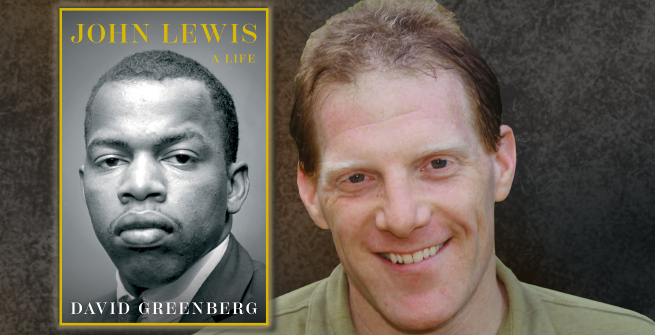David Greenberg is a former editor of The New Republic and a current professor of history, journalism, and media studies at Rutgers University. His byline has appeared in The New York Times, Washington Post, The New Yorker, Wall Street Journal, The Atlantic, Slate and Politico among other publications. He is also an award recipient of institutions, including the National Endowment for the Humanities and the Guggenheim Foundation. He received his BA from Yale University and his P.hD from Columbia. He is the author of Nixon’s Shadow and The Republic of Spin.
How long did it take for you to do this book?
I started the research in 2019 and finished at the end of 2023. Of course, it takes some time to publish the book. So, about four or five years in all.
What was the most surprising thing you found out about John Lewis?
There were so many surprises and discoveries. Some of these things were small but interesting: the fact that he was a tremendous collector of African-American art and got to know some of America's greatest Black artists, like Vermeer, Bearden, and Jacob Lawrence. I learned things about his wife, Lillian. [Lillian] is an important part of the book that I think was not well known, just how important she was to his career, how much of a driving force, who helped him find the confidence to pursue his ambitions to run for office and to ascend in office.
I found him to be a much more canny politician, a kind of skilled Washington player than I had expected. We all know the side of John Lewis that is deeply principled, but in 30-plus years in Washington, [he] learned to become an effective congressman, an effective leader of the Democratic caucus, and he got good at how you use your moral authority for political gain.
What, if any, were the challenges in bringing this book to publication?
Only at the beginning. There's always a little bit of thinking, 'Is this the right project?' 'Are people going to be interested?' All you hear about is one wonderful story after another, so discovering the complexity in him, discovering that he made some enemies in his day, that he did things that were open to criticism. The other practical challenge was just getting to him. When I was starting, I wanted his blessing, which he did give me, to write the book and to have his friends, staff, and others cooperate with me.
The week before I met with him, he had done the coin toss at the Super Bowl, and the day after I met with him, he went to Los Angeles for the Oscars to introduce Green Book. So, I felt lucky to get 45 minutes with him on a Friday afternoon. Once I spoke with him and got to know his chief of staff, a wonderful man named Michael Collins, then things started coming more easily. Doors started opening. People were willing to speak to me and be interviewed.
Do you believe that younger people today are truly aware of the origins of the Civil Rights Movement?
I teach undergraduates at Rutgers University, and these are public school students; they do know something about the civil rights movement. It's taught as a standard part of the US History curriculum pretty much everywhere, in red states as well as blue states.
John Lewis is certainly one of the names which are in the history books and textbooks, but a lot of our education, in general, can be somewhat superficial. People learn about the fight against segregation, but it doesn't always go that deep.
Do you read bios, and if so, what other bios have you read?
Oh, I do all the time. For this book, it was actually kind of a pleasure because, in my research, I was reading biographies of King, Bayard, Rustin, and Stokely Carmichael of all kinds of figures because I wanted to understand them as figures in full. I read there's a great new biography of Ronald Reagan by Max Booth. I'm reading a biography of Shirley Chisholm right now. I read a lot of biographies, especially political biographies, but also biographies of writers, intellectual figures, and journalists I like to read about.
Any other books that don't have to be bios that you've read recently in the last year or two?
I enjoy fiction as well. Right now, I'm reading James McBride's Heaven and Earth Grocery Store. Yes, he's a favorite writer of mine. You know, I sometimes go and read like I just read some F. Scott Fitzgerald that I hadn't read.
Are you thinking of or working on a next project?
I have a lot of ideas percolating right now, and. But honestly, it's been gratifying. The reception of this biography has been great. I mean, more intense than any book I've published before. So I'm mainly spending a lot of time talking about the book to audiences in interviews, you know, doing podcasts, stuff like that.
What's the one question you get over and over from your journalism students at Rutgers?
It probably is not so much about John Lewis or civil rights. One thing I think they're really interested in is objectivity and bias in the media. I think a lot of them want to know if it is still possible to have journalism newspapers that are unbiased, that can kind of give us the news, give us a factual account, without it seeming like special pleading for one side or the other.

